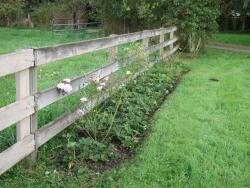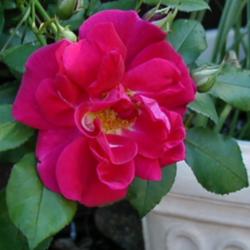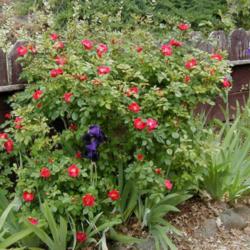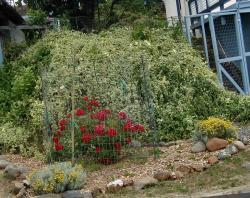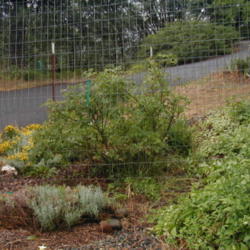Actually, it is almost impossible for anyone who does not live locally to you to advise you about disease resistance to black spot in your area. With the advances of horticultural sciences in the last few decades, it has been learned that there are 15 races of black spot in the world. Five of them are found in the United States. The black spot that appears in my garden may not be the black spot you find in your garden. For me to suggest a rose that his been clean for me, may lead you to plant a rose disaster. Not only are there different strains of bs, but the fungus is constantly mutating ... as is the rose. Roses generally have one gene that impacts its ability to resist bs. This is called vertical resistance by the scientists mentioned above. That gene can mutate and the rose will lose its bs resistance. Ooops ...
Bill Radler's success with the Knock Out roses came from intensive study and experimenting with inoculating the soils and roses with all five strains of bs found in the US. The seedlings he brought forward, were those that showed incredible resistance to bs. This is is call horizontal resistance in that they found the there were several genes in theses roses that resisted bs. But even Knock Outs have been shown to be bs prone in some areas of the country.
In my personal experience, I am growing roses that have a reputation for being bs messes that are generally clean for me in my garden and my climate. Another rose friend growing the same rose from the same original source in another state says her rose defoliates each spring. How could I possibly recommend a rose to you ? It doesn't matter how long I've grown roses or how many different roses I have grown over the past few decades, my climate and the bs that is active here is not the same as yours.
"Playboy' is one of those bs disasters in southern California, yet in Zuzu's garden it is a clean rose .... different strains of bs are active in different parts of the country. The marketing hype that a rose is disease resistant always makes me wonder who wrote the copy. It certainly wasn't someone who is familiar with the new information about this fungal disease.
Your fence looks like the perfect spot to plant many of what we call ogrs (old garden roses). These are the roses that have certainly passed the test of time and are the survivors of thousands of roses that were introduced and found to be poor garden roses due to poor disease resistance. To find the roses that are successful in your area of the country and in your climate, I suggest you contact the Heritage Rose Group that is active in your area. (From I have read, they have some great people.) Again, check locally. The ogrs that grow well in Southern California, may not be the best roses for you in your part of the country.
Yes, I like the floribundas, too. Some work just fine here and some are gone because they were not the right rose for this garden.
Young roses are more prone to disease as they have not built up their immunity systems ... just like young children. Often it take a rose three to four years to reach sufficient maturity to shrug off disease. So many people give up on these roses far too soon and the roses never have the chance to become the magnificent plants they can be because while they were young, they were more susceptible to disease.
Yes, it's true, there are roses that put up a sign that says welcome to any and all rose diseases known to roses.

Over time, these roses disappear from the market.
Of course, there are other variables that can impact a rose's disease resistance.
Good luck with your new adventure.
Smiles,
Lyn
